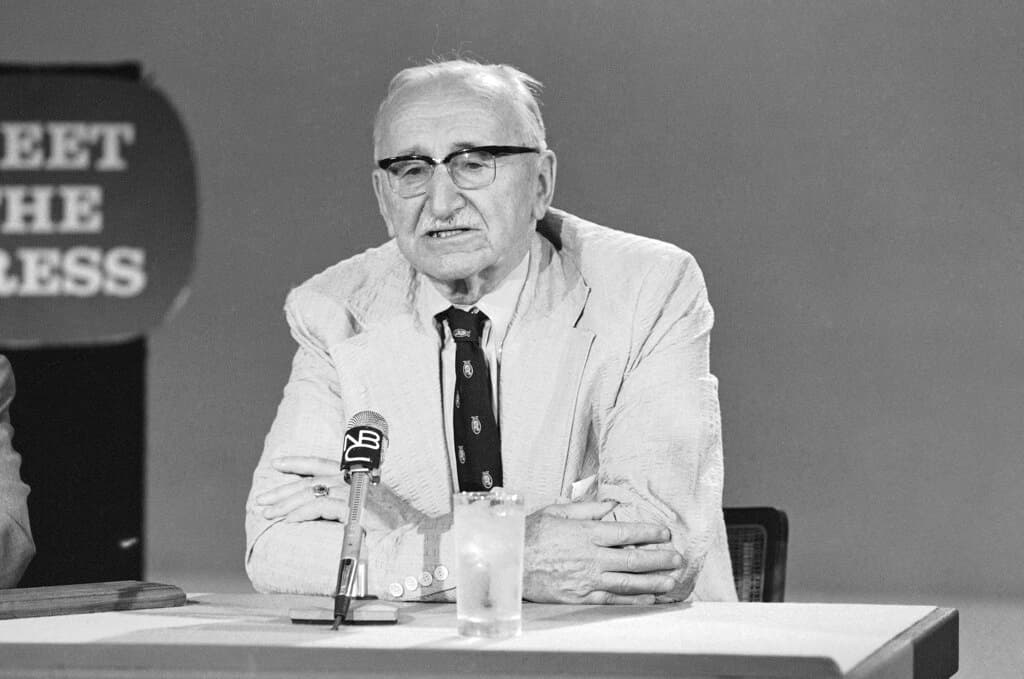The Great Pretenders: 50th Anniversary of Hayek’s Nobel Prize Acceptance Speech Is Marked — and What an Apt Moment
The economic sage saw that the attempts of central bankers to control the markets is based on a ‘pretense of knowledge.’

This is the 50th anniversary of Friedrich Hayek’s 1974 Nobel Prize Lecture, “The Pretense of Knowledge.” In his brilliant presentation, which applies particularly to central banks and their yearning to be economic philosopher-kings, Hayek explained the inherent limits of economics and the inevitable failure of trying to make it a predictive mathematical science.
This was nicely ironic, since the formal name of the award he was receiving is the “Sveriges Riksbank Prize in Economic Sciences,” which celebrates both the “economics is science” idea and the world’s oldest central bank. “Economics is history trying to be physics,” a Wall Street friend told me years ago. He might equally have said, “It is philosophy trying to be physics.”
As Hayek maintained, in the attempt to be physics — to be used for top-down control by central banks — economics has not, but more importantly, cannot succeed. In 1974, Hayek pointed out that “the serious threat of accelerating inflation,” which became the disastrous Great Inflation of that decade, “has been brought about by policies which the majority of economists recommended and even urged.”
Among the things they got wrong was the “Phillips Curve” economic theory that inflation would bring lower unemployment. “The dominant ‘macro-economic theory,’” Hayek predicted, “is likely to make later large-scale unemployment inevitable.”Indeed, the decade ended with simultaneous high inflation and high unemployment.
Said Hayek, expressing the contrasting theory: “Unemployment indicates that the structure of relative prices and wages has been distorted (usually by monopolistic or government price fixing).” What are central banks but monopolists of the paper currency and a government committee to fix prices (interest rates).
The Federal Reserve once again demonstrated its power to distort relative prices and credit allocation through its purchase of $2.7 trillion in mortgage securities. That vast monetization of mortgages stoked the second great house price inflation of the 21st century and succeeded in making houses unaffordable for large numbers of Americans, once the abnormally low mortgage interest rates the Fed created went back to normal.
It’s obvious when you think about it, but societies of human beings are not mechanisms with mathematical laws governing their behavior. Instead they are, in Hayek’s term, “phenomena of organized complexity,” fundamentally different in nature from a physical system. They have a different “manner in which the individual elements are connected to each other.” In short, they are connected by minds, and ideas are causal forces in their behavior.
Acting human beings in a society or a market are always looking ahead, anticipating what the actions of the central bank or other parts of the government will be, trying to influence others, changing their beliefs, strategizing, trying to bluff or mislead opponents, forming expectations in response to each other’s expectations.
The resulting reality is marked by deep recursiveness, reflexivity, and uncertainty.It represents “a sum of facts which in their totality cannot be known to the scientific observer or to any other single brain.” This knowledge so dispersed is “the source of the superiority of the market order,” Hayek said. It is also the source of the poor record of central bank forecasts, the checkered history of central banking in general, and the impossibility of making economics into physics.
So pity the Federal Reserve governors and presidents who must meet to fix prices as the Federal Open Market Committee.All of them must know in their hearts, each one, that they do not and cannot know the economic and financial future. With 50 more years of institutional experience since Hayek spoke at the Nobel Prize ceremony, they must know that economics is not and cannot be a mathematically predictive science.
Yet they are forced to make forecasts and guesses while they cannot know what the results will be. “All the world’s a stage,” no doubt, and the Fed cannot avoid being on the stage, and the show must go on. What, though, do the actors in this show really think? Let us hope they have taken to heart Hayek’s lesson that the “insuperable limits to knowledge” ought to teach humility, so that central bankers remain skeptical about their own forced guessing.
What if, in the end, central bankers believe in the “pretense of knowledge” of their own press releases and flatter themselves that they really are in possession of the scientific, mathematical power to manipulate everybody else for their own good? Hayek ended his great lecture by warning against the danger of this “fatal striving to control society,” which produces tyrannical behavior.

